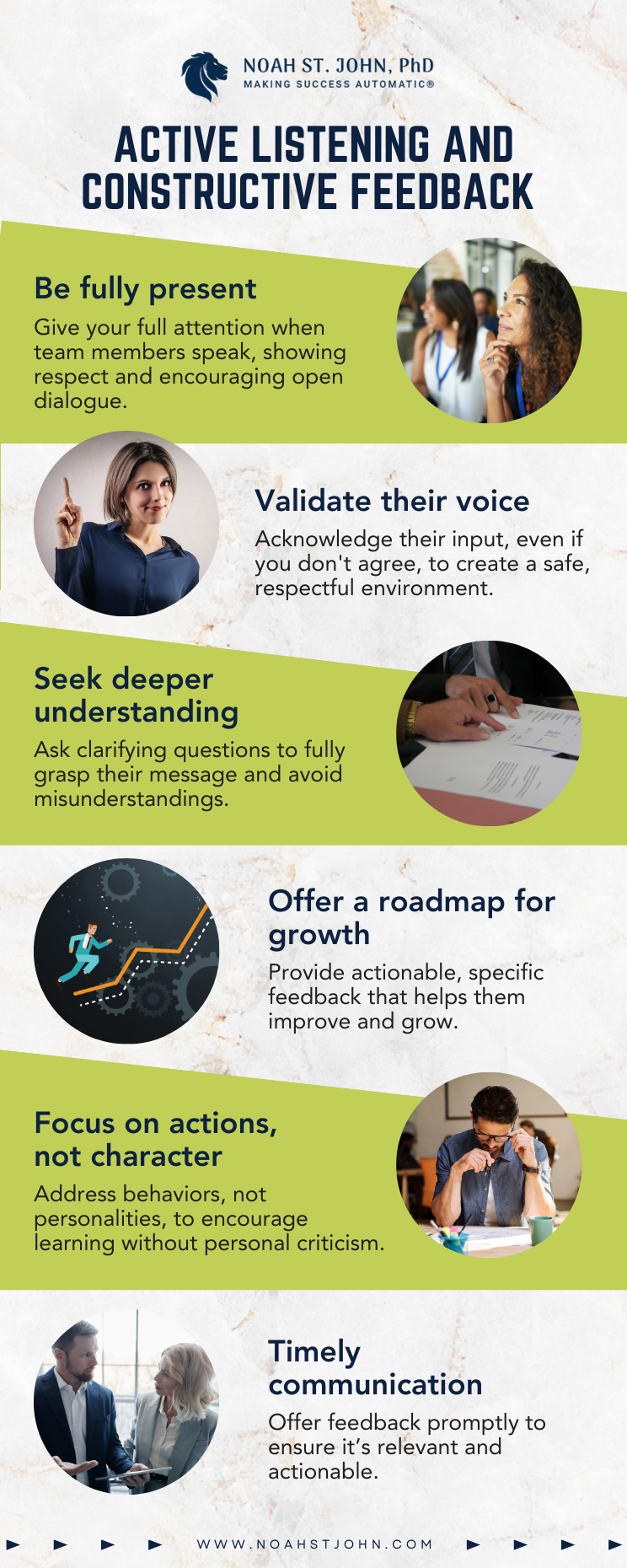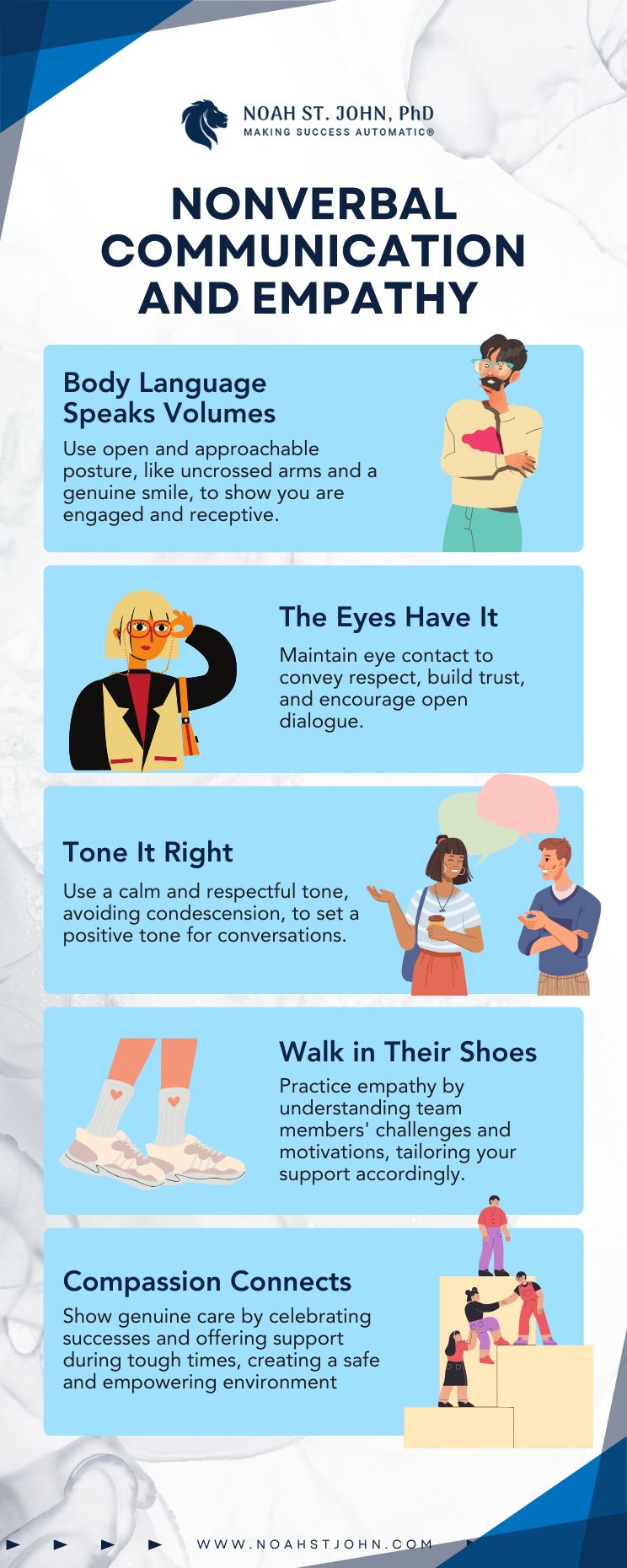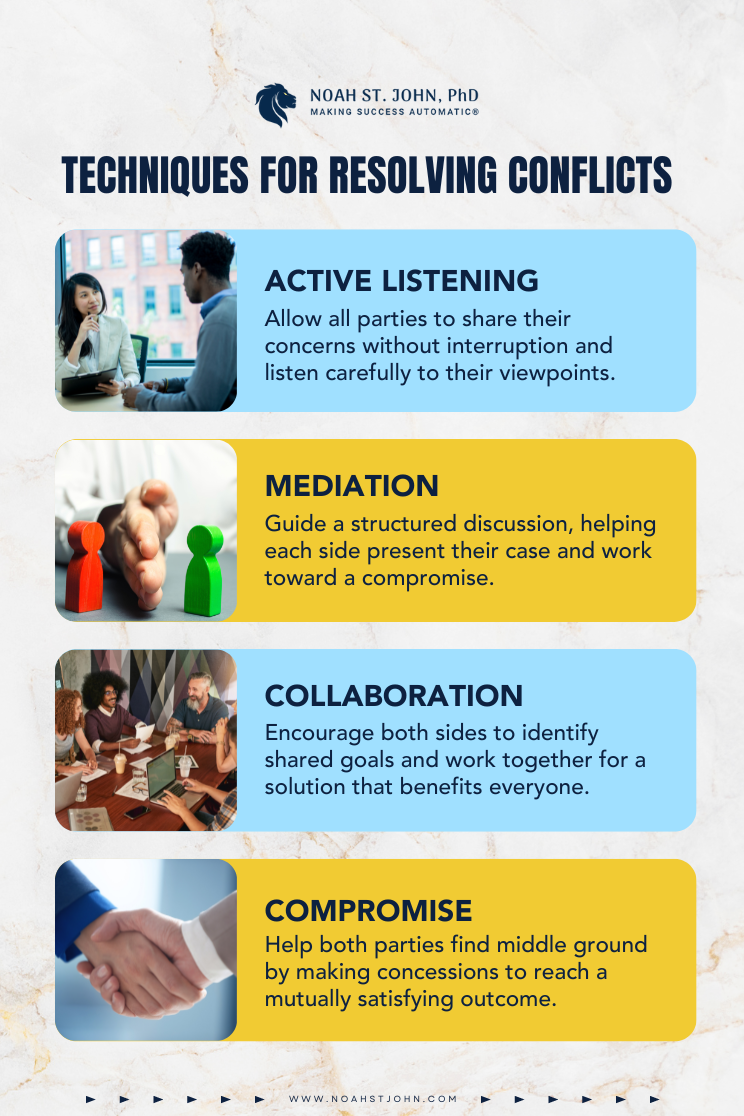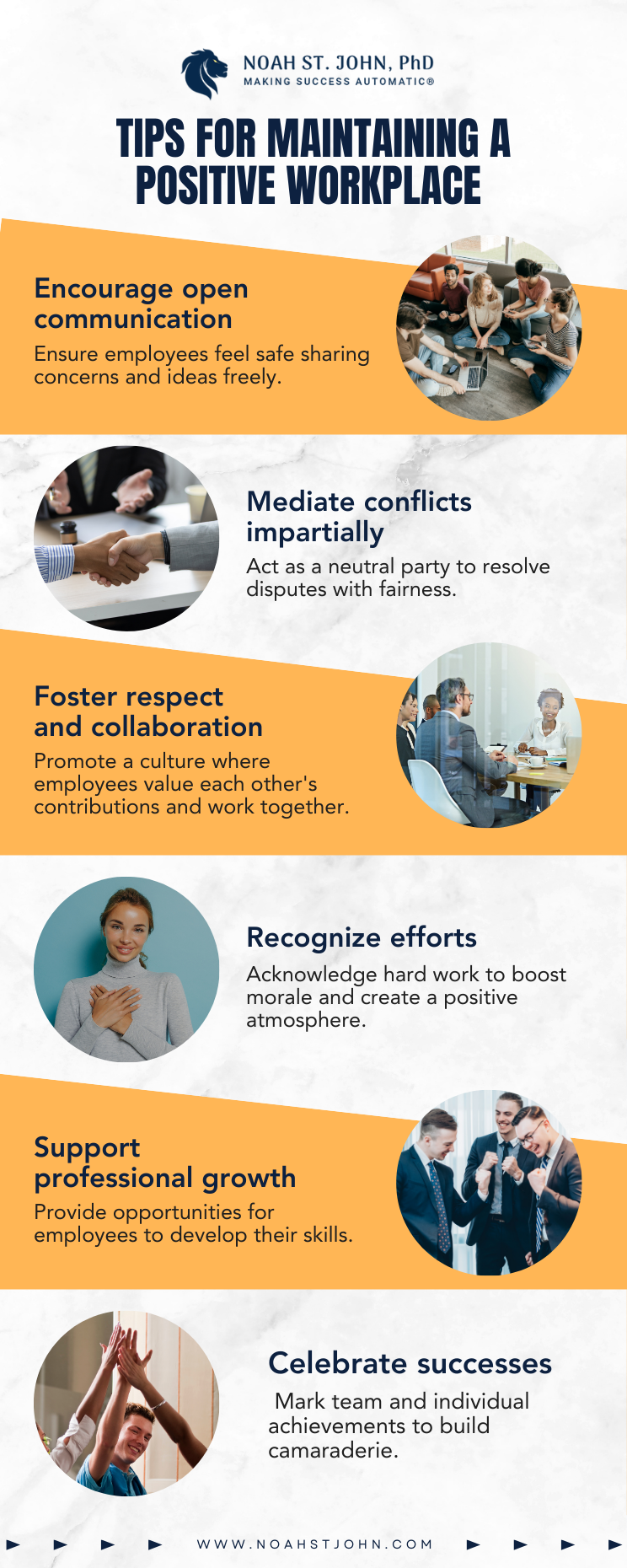In the fast-paced, ever-changing world of business, being a leader isn't just about having a fancy title or occupying a corner office. It's about possessing a unique blend of skills that can truly ignite success, inspire teams, and steer your organization toward a brighter future. Imagine a world where you effortlessly navigate the intricate dance of leadership, making decisions that propel your business forward, and fostering an environment where innovation thrives and trust flourishes.
This isn't some distant dream – it's a reality within your grasp. By honing and mastering essential leadership skills, you can revolutionize your approach to leadership and achieve results you never thought possible.
Bonus Material: Book a Discovery Call For Our Coaching Program
Clear communication is essential for setting expectations, aligning teams, and ensuring everyone is working towards the same goals. Ambiguity or lack of clarity can lead to misunderstandings, decreased productivity, and missed opportunities.
To communicate effectively, leaders should:
When leaders actively listen, they demonstrate respect for their team members and create a safe space for dialogue. Constructive feedback helps team members grow and develop their skills.
To practice active listening and provide constructive feedback, leaders should:

By incorporating these practices into your leadership style, you'll not only foster a more collaborative and supportive work environment but also empower your team members to reach their full potential.
Remember, effective communication is a two-way street, and by demonstrating your commitment to active listening and constructive feedback, you'll inspire the same level of engagement and growth from your team.
Empathy, the ability to understand and share the feelings of others, is also crucial for effective communication.
To foster a truly connected and motivated team, leaders should embrace the power of nonverbal communication and empathy. Here's how to elevate your leadership presence:

When employees see their leaders practicing empathy and open communication, they are more likely to adopt these behaviors themselves, creating a ripple effect of positive interactions throughout the organization.
Bonus Material: Claim Your FREE Copy of My New Book, Get Rid of Your Head Trash About Money (just cover s&h)
It's a complex skill set that extends beyond intellectual capabilities, delving into the realm of interpersonal dynamics and self-awareness. High EQ leaders tend to foster healthier relationships, navigate conflicts with grace, and cultivate a positive work environment.
Emotional intelligence plays a pivotal role in various aspects of leadership:
Emotional intelligence is a multifaceted construct composed of several key components:
Emotional intelligence, like any skill, can be developed and honed through dedicated effort and practice. Here are some effective strategies for enhancing your EQ:
By investing in the development of your emotional intelligence, you not only enhance your leadership capabilities but also contribute to a more positive and productive work environment.
This skill involves a systematic approach that includes gathering relevant information from various sources, critically analyzing the data to identify patterns and trends, and carefully considering the potential consequences of each option.
Effective decision-making is a cornerstone of successful leadership, enabling organizations to navigate challenges and seize opportunities.
Leaders must actively seek out diverse perspectives and data points to gain a comprehensive understanding of the situation at hand. This process may involve consulting with experts, conducting surveys or focus groups, and analyzing historical data.
Once the information is gathered and analyzed, leaders must evaluate the potential outcomes of each decision. This involves weighing the risks and rewards, considering the short-term and long-term consequences, and anticipating potential obstacles.
By following a structured approach to decision-making, leaders can increase the likelihood of making sound choices that benefit their organizations and stakeholders.
Building a high-performance team involves understanding group dynamics and fostering a collaborative environment where everyone can thrive. Team dynamics encompass the interactions, relationships, and communication patterns within a group.
Effective teams are built on a foundation of mutual respect, trust, and open communication. By understanding the different roles team members play, their strengths and weaknesses, and how they interact with one another, leaders can create a more cohesive and productive unit.
Conflicts are inevitable in any team, but how they are managed can significantly impact team dynamics. Addressing conflicts promptly and constructively can strengthen team bonds and prevent them from escalating.
When team members feel valued, supported, and empowered, they are more likely to be engaged, productive, and committed to achieving team goals.
Clearly defined goals provide team members with a sense of purpose and direction. Goals should be challenging but achievable, and they should be aligned with the overall vision and mission of the team.
Recognizing and rewarding individual and team achievements can boost morale, increase motivation, and reinforce desired behaviors.
Investing in the professional development of team members demonstrates a commitment to their growth and can help them develop new skills and knowledge that benefit both the individual and the team.
Adaptability empowers leaders to make informed decisions, seize emerging opportunities, and mitigate potential risks. By cultivating a mindset of flexibility and resilience, individuals and organizations can thrive in an ever-evolving landscape.
This approach not only enhances organizational agility but also cultivates a sense of trust and collaboration among employees.
Key benefits of adaptability in leadership:
Organizations must invest in training programs that equip employees with the skills and knowledge needed to adapt to new technologies, processes, and market trends.
Additionally, fostering a culture of continuous learning and development encourages employees to embrace change as an opportunity for growth.
Strategies for building an adaptable workforce:
Bonus Material: Gain admission to my NEW digital course for FREE.
Effective conflict resolution maintains a positive and productive workplace. It involves addressing disputes promptly and fairly. By implementing proactive strategies, leaders can transform conflicts into opportunities for growth and strengthen team dynamics.
When conflicts arise, leaders should employ a range of techniques to find amicable solutions. These techniques focus on understanding the root causes of the conflict and facilitating constructive dialogue between the parties involved.
Conflict resolution techniques aim to de-escalate tensions and promote understanding. Leaders can use these techniques to guide conflicting parties toward mutually agreeable solutions.

Creating a harmonious work environment is crucial for productivity and employee satisfaction. Leaders play a pivotal role in fostering a positive workplace culture where conflicts are addressed constructively.
A positive workplace culture promotes collaboration, respect, and open communication. By cultivating a positive environment, leaders can prevent conflicts from escalating and create a more enjoyable workplace for everyone.

Mentorship and coaching play a crucial role in nurturing the growth and development of individuals, empowering them to reach their full potential and become effective leaders. These processes involve guiding, supporting, and inspiring individuals to enhance their skills, knowledge, and confidence.
They are about establishing meaningful relationships where mentors and coaches act as trusted advisors, role models, and advocates for their mentees. Through these relationships, mentees gain valuable insights, perspectives, and feedback that enable them to navigate challenges, make informed decisions, and achieve their goals.
Mentoring focuses on the long-term development of individuals, offering guidance, support, and advice based on the mentor's experience and expertise. Mentors share their knowledge, insights, and lessons learned, helping mentees develop their skills, broaden their perspectives, and navigate their career paths.
Coaching is a more structured and goal-oriented process, designed to help individuals enhance specific skills or achieve specific objectives. Coaches work with individuals to identify their strengths and weaknesses, set goals, develop action plans, and overcome obstacles.

By investing in these processes, organizations can cultivate a strong pipeline of future leaders who are equipped to tackle the challenges of the 21st century.
Inspiring Stories of Leadership Transformation
Here are a few stories of leaders who transformed their leadership style by mastering these skills:
Founder & CEO of Aerial Development Group and Real Estate Developer
"As a result of following Noah St. John's coaching advice, I built the largest infill development company in Nashville with over $40 Million in sales!”
Britnie's relentless drive, combined with My insightful coaching, propelled her infill development company to the forefront of the Nashville market. Her company secured a dominant position, achieving the distinction of being the largest in the city. Britnie's success is underscored by an impressive sales record exceeding $40 million.
Professional Meeting Planner, Simply Divine Events
What is the most important leadership skill?
While all leadership skills are important, emotional intelligence often stands out because it affects all aspects of leadership, from decision-making to team building.
How can I improve my leadership skills?
Continuous learning, seeking feedback, and practicing specific skills such as communication, empathy, and decision-making can significantly improve your leadership abilities.
Why is diversity important in leadership?
Diversity brings a variety of perspectives and ideas, which can lead to more innovative solutions and a more inclusive work environment.
Mastering these top leadership skills can transform your leadership style and drive remarkable results for your organization. Whether it’s through effective communication, emotional intelligence, or adaptability, each skill plays a crucial role in modern leadership. If you're ready to elevate your leadership journey, consider investing in a comprehensive coaching program that can provide tailored guidance and support. Start your transformation today and become the leader your team needs.
Bonus Material: Book Your Complimentary Breakthrough Session Now
What does it mean to be an inspiring leader? An inspiring leader is someone that people follow, if you're a leader and nobody's following you, you're not really a leader or you lack leadership skills. Think of the world's most inspiring leaders, who are inspiring leaders throughout history?
How can you become an inspiring leader? How can you have more impact on the employees in your life? More Influence on people all around the world and more income that you can enjoy the finer things in life.
What is the mission that you are here to embody on the earth?
That's not going to inspire many people. John F. Kennedy didn't say we're going to the moon because it's going to make me a lot of money. Martin Luther King didn't say I have a dream and that's to make a lot of money.
This represents an established attribute of the two, this example is required for us to create better understanding out of it.
That's the point, it's not that we don't want to make money, but we have to have something bigger like the integrity and mission at successclinic.com by Noah is to eliminate not enoughness from the world.
For some that's like, who cares about the passion, who cares if you feel inspired or you have the power to lead. For others, that's really inspiring because it can make the argument that most human problems come from the belief of not enough.
You have the qualities of a successful model, you provide true motivation in every person and you have the ability to lead people in positive commitment which became an inspiration with some people.
We can make the argument that most human conflict comes from this belief and not enough. That's the mission, to eliminate not enough.
If you buy into that mission great, if you don't, great, but the point is people on the team are on board on that mission so you as the leader you gotta be very clear on your mission.
Focus on the job and the role as you build the strengths of your mission and find the meaning of every individual's capabilities.
You gotta tell inspiring stories that are connected to your mission. Position yourself as a future realism picture that has highly challenges and shortcomings in life.
Ideas like tell a story of growing up poor in a rich neighborhood and how that taught me the difference between the haves and the have not, the houses, everyone else, the community to have knots in my family.

From a very young age I hated not enough, that's what I grew up in. I grew up in a family of not enough and yet down the street I saw that there was great wealth and abundance, I said this sucks what can I do about it?
How will I invest in living in success if I can't think of attributes of consistently supportive people. Isn't that what entrepreneurship really having a vision is always all about seeing a problem.
A human problem and working to solve it that's what Dr. Martin Luther King did in I have a dream, that's what his I have a dream speech is all about, that's what John F.
Kennedy did to bring a man to the moon and bring it back safely to the earth by the end of that decade. Abraham Lincoln abolish slavery and on you can literally say the leader's name and understand in a moment what their vision was and also the stories that they told about it.
Abraham Lincoln, a nation divided or a house divided against itself cannot stand and all of the great quotes from JFK and Martin Luther King and all the great leaders.
Throughout history Winston Churchill and George Washington and on, tell stories related to the mission and to your vision. Aspire on modeling relevant spikes to generate and promote the movements you want to establish.
You've got to roll up your sleeves and be willing to do the work alongside them.
That's what makes leaders like Elon Musk inspiring to many people because he gets down into it, he rolls up his sleeves, he wants to be an astronaut, he wants to go to mars and he's helping the human race get to that next evolution of humanity.
You've got to double the moments you have with your employees, don't accept single praise, let your people be on your success. Your people, employees, and coworkers, they are with you during your ambitious stage.
When you pursue your standards, hope for your company, when your curiosity leads to practicing and establishing that common grounds and benefits with your people.
The point is, not everyone's gonna agree with them but are you willing to do the work as the leader? George Washington was always on the front lines with his troops he had at least three to five horses shot out from under him and his generals.
His lieutenants would beg him stop getting on your horse, we need you George, you're gonna get shot and he never did. He had three horses shot out from under him, fortunately for America.
He didn't get shot but what I mean is he was in the front, he wasn't cowering in the back. you've got to be the leader willing to do the work, that's not to say you should do everything.
There's a very fine line between being willing to do the work and also delegating.

That's one of the things that we help our Inner Circle clients with is this whole process of delegation because there comes a point in your business where you can't do everything when you're starting out in your business.
You have more time than money and then all of a sudden you're making money but now i don't have any time.
It's not that you're gonna do everything and that's why you have to have the systems and processes in place so that you can delegate effectively and that's one of the things that we help our 30k Income Clients with Inner Circle Clients with Noah as well.
Resources are available for you, you too can have more time, more energy, better relationships, and more money, and if you want my team to do all this for you get put all this in place and apply to be one of our inner circle done for you.
In the real world, competition is at a high level, a lot of people are leading, direction can be crucial and developing experience to gain opportunities to some companies are critical for development and responsibility of an individual.
However, behaviors, values and traits of a person is a core key to grow in communication, be motivational, may gain engagement, may develop positive performance in an organization.
Every employee has goals to motivate the truth in the quality of actions and be able to trust the process of growth to support personal action inside the organization. The truth is, the culture inside the organization and the leader shows what followers they have.
If organizations have the talent to encourage customers and accomplish effective excellence, then an organization has the spirit and principles of a great organization.
Leaders must be challenging the employees but offer them gratitude and respect, recognizing the contribution and accomplishment in an honest tone.
Let yourself as a leader be engaged in watching with sense and safety habits to compromise specific attitudes and environment towards your employees and the workplace.
Remain passionate and give rewards in positivity to foster the drive to learn that creates excellent ways to increase strong and unique managers. Listening is a great way to achieve a set of change, it helps the mind to demonstrate with care and behave in a competitive way.
People are learning to move with complete honesty, chance and breakthroughs, let's make that mindset filled with attributes of a positive leader.
A leader is someone who inspires people to be their best and to do more than whatever they thought they could.
I'm going to show three differences between a boss and a leader for you to see which behaviors best describe you. And maybe, for you to see if you can move a little more, developing from a boss to a leader.
So, let's talk about boss versus leader. What's the big deal and what's the difference?
Well, there's a lot of us who are entrepreneurs. We're entrepreneurs, people who are growing their business or just getting started so whether you're just starting out in your business or whether you've been doing this for a while or maybe you've been doing this for five or even 10 years or more, there's going to be a point in your business where you're going to have people that work with you and maybe some that work for you.
You have to expect that managing and leading people will be added to your responsibilities now.
And, there are differences in how a boss and a leader approach their jobs. A boss will take pleasure in the power they own while a leader will ensure an encouraging environment.
As you grow and you're getting started in your business, generally speaking, you always have more time than money.
Time and money are always the two resources that are in an eternal struggle. When you're starting out your business, usually 99 percent of the time, you have more time than money because you don't really have any money coming in as you're just starting out in business, unless you have a rich uncle somewhere you have an inheritance.
Most of us don't start out with a lot of money which is really difficult because you've got to do it all by yourself. It takes commitment so the business stays in the game.
For example, I started my company successclinic.com in my college dorm room in 1997, in the middle of a recession with 800 dollars to my name and a book on HTML. That's all I had to start with.
Since those very humble beginnings, over the last two decades, helped our coaching clients at over 2.7 billion dollars using my methods. We've helped people just like you to add six figures, multiple six figures, seven figures and yes, even eight figures using my methods.
How have I done that well?
I teach my inner game and outer game methods and I also teach what I now call my authority cycle formula.
The authority cycle formula is where I show you how to go from “I don't even know what I'm doing ” or “ I have an idea but I don't know how to get started to ”or “ I don't know what my offers are”, and “I don't know how to build a funnel and I need to get traffic”.
I'll walk you through all those stages in my courses like 30k income secrets and my elite inner circle. That's what we call the authority cycle formula.
What does that mean for you?
As you're growing your business, you're going to go through those stages where you're going to have to bring somebody in. Because as you start to bring in more money, probably your time is going down bringing clients. The more clients you get, you're going to reach a point where “Oh my gosh! You know what? This is great! I'm busy but I don't have any time”.
You’re going to have to have people work for you, basically, whether they're a virtual assistant or maybe you're going to have someone help you with your traffic or help you build your funnels or help you with your social media whatever it might be, you're going to have people that work for you.
First of all, one of the things that I've noticed over the last two decades of working with countless entrepreneurs, business owners, CEOs, and executives is that bosses tell more than they listen, whereas leaders listen more than they tell.
Now you've heard the saying before, “We have two ears and one mouth so we should listen twice as much as we speak.” But, that never happens. Nobody ever does that but that's one of the things that we should look for when we are looking to bring in people.
One of the certain things you’ll do now, of course, you have to tell people what you want. You have to be clear about what it is that you want but you're also going to have to listen.

As a leader, you have to listen. You have to listen to what the real issues are. Your role is to create a workplace where effective communication is present.
I remember when I was just starting out in business, I really didn't know what I was doing. I had no experience in marketing or business or accounting or sales or online business. There was no such thing as funnels, no such thing as social media. There was none of that so I didn't know what I didn't even know. And, that's one of the big, big problems in business.
A lot of times you don't know what you don't know, that's why it's so important to listen.
It seems that maybe that's a time when you need to bring in a coach. You need to bring in a coach, a mentor, or someone who's been there, someone who’s been on the top of the mountain. Someone who can help you get there even faster, much faster, and easier to your goal.
An expert business coach has the ability to see and picture out the workflow from a critical perspective. One who has been in the industry dealing with management and system problems and providing solutions for years. It never hurts one or even a company to receive coaching strategies. After all, it has been a key why businesses achieve their goals skyrocketed year after year.
However, you also need to listen to the people that work for you. You need to understand why you should encourage them to work with you, instead.
For instance, let's say you have someone who is doing your customer service. You need to listen and know what you're hearing from your clients, your customers, their concerns, problems, what they are frustrated about, and what they are not getting.
Hence, the more you listen, the more you’ll be able to help people. The more referrals you're going to get, the more money you're going to make.
On number two, bosses command whereas leaders inspire. A leader teaches you why and how to do it.
When you're a boss, you're telling people what to do, do this and do that. You know the Gopher method, go for this and go for that. That's all great and wonderful if you are a genius and if you know everything.
Yet, most of us aren't like that. Most people don't know everything. I don't think anybody knows everything, right?
Therefore, a leader should:
Clarity is very, very important yet it is also important that you develop constructive approaches. The influence you have as a leader reflects how your followers feel.
How can your employees stay motivated? So, how do you inspire people?
Find out what's important to them so you can know what their priorities are, characteristics they have, and assess where they focus on.
Leadership, just like in relationships, values the process of earning trust.

Both are considered workers, in control of each performance. Expectations are met when both know their positions and play their role effectively. It benefits both sides when their purpose is working and learning together.
When the vision isn't to instill fear but build confidence, any individual in a team can produce quality results and have a great impact on the company's growth.
You have to listen and ask better questions like Afformations®. You can go to afformations.com and learn how to ask much better questions, empowering questions. These are not typical feedback, it nurtures positive feelings within the employee. It is driven by creating a strong connection, focuses, and supports what the individual can offer.
In fact, you should influence everyone on your team, your staff to use Afformations®. Why? Because that will help them to get really better and faster results with far less effort. Practice to hear and explain.
There's an old saying that goes around, “It's amazing what you can do when you don't care who gets the credit”. Bosses take credit and give responsibility whereas leaders take responsibility and give credit.
Leaders aren't after the praise and claps, they want you to do better than they did and be successful with your career.
I'm sure you've probably been in a situation where you did something and you did a lot of work. Then, maybe somebody took credit for your work. I know I have and that really hurts.
It takes away your joy, your passion and your inspiration. Frankly saying, it can really make you mad. Imagine if you do all this work and then somebody else takes the credit for it.
We see humans are always starving for recognition and appreciation. We just want somebody to listen to us because most people don't.
Even people closest to us, our friends and family, usually don't listen very well. Most people don't and that's not to say they're bad people. They just haven't been taught how to listen and maybe they don't really understand how important it is.
As a boss, they are the ones that take credit. “Hey, I did this. This is all my work because I’m a visionary. I have supervision and that's why I'm the supervisor!" But, when something goes wrong, they sort of throw the blame around other people.
There’s an old saying: “Success has many fathers but failure is an orphan.” When there’s success, everybody wants to take the credit.
I can't tell you how many people I've heard from over the years who said, “Well, I was the number one sales trainer.” Like how many number one sales trainers do they have? I wonder if you know it's all the same person. So, they really have 50 sales trainers who claim to be number one. It’s interesting how most people pretend to be the top yet never really gave the same energy to fight and win the spot.
If something does go wrong, who's going to want to step up and say, “Yeah, you know what that was on me.” That's what a leader does!
Leaders operate legacy in their minds, not competition. Leaders set an example in self-accountability. You know and listen even if it wasn't technically your fault.
Let's say someone on your team does something wrong. They really messed it up. Sometimes, it is really their fault. It’s their responsibility and you really didn't do anything wrong. Nevertheless, as a leader, you have to talk to that person and you may want to do it in a private setting.
When something goes wrong, what you don't want to do is embarrass the person in public. That's not really a good idea because:
Thus, you may want to take them in private and talk about what happened, what went wrong. Notice what you're doing, asking, and listening.

For the most part, we want to correct this. Basically, 99 times out of 100, it's a systems problem, not a people problem.
People usually do very good work when you give them the parameters to do the work. It’s still on you as the leader. You can say, “You know what, that's a really good point and that I really wasn't clear enough and we needed to clarify that so let's systematize this process. Let's put this in place and so that way we won't have that mistake in the future.”
Every single time, I mean 99 times out of 100, it's really a systems problem. It's a system that wasn't clear which really does fall on you as the leader. You may want to review the system and impart where knowledge and understanding are in need.
As the leader you really don’t want to take credit and give responsibility. You should want to take responsibility and share the credit.
“Hey, you know what we wouldn't have gotten there without the team, without all of us. Teamwork makes the dream work.”
You now have valuable ideas to follow and share with your employees or future subordinates.
Maybe you want to lead a business that you aren't sure of or want to leave the boss role, for those who want to learn more about how to start and scale your online business and really hit that 10 or 20 or even 30k per month. Remember this is from the safety and comfort of your own home. Everything’s virtual nowadays, so might as well experience this kind of job and level up the way you lead.
High standards and competency are required and expected when you take leadership roles. It usually focuses on skills, training processes, and making decisions. Often neglected are the ability to balance emotions, approach mistakes in the development of sustainable solutions, and their mission to motivate each employee to grow with the tasks they delegate.
Everyone wants to be the leader because they like being dominant, turns out they just feel like being a boss. They want people to follow the policy and term they created as a servant does. They are fond of foul language, criticism, and ineffective approach. Even so-called professionals turn out to be drowned by the dark side of company politics, unable to change their bad behavior.
Competent leaders do a fantastic job of being people experts. They are emotional because they are sensitive to people's feelings which makes it easier for them to work with teams to provide and improve the needs of the organization.
Effective leadership makes a great difference. It creates opportunities for growth and development, not only with the company's position in the economy but also with people's success.
“The definition of a true leader lies with the trust you give, felt in the passion you offer, and witnessed in the purpose you show.”
So, what cards are you going to play now? Is it just authority you truly want or are you up to making a big difference to influence people with your vision?
Today's crazy times: are you one of the leaders who have followers? Are you wanting to be an influencer? Do you want to have more impact, more influence, and more income even especially right now in today's great times? Well, in today's Ask Noah St. John's training, I'm going to give you my top three leadership qualities that I have seen and observed which helped my coaching clients over the last two decades to add more than 2.7 billion dollars using my strategic methods.
Are you an effective leader right now or do you want to lead and earn respect from your subordinates? Do you have a company or team that you are planning to lead? Do you want to have a team of people that you can help develop a culture of understanding and growth? If you don't have a team then you're not much of a leader, are you? If you are a leader and no one's following then you're not really much of a leader.
So, there are three hugely important qualities, I will share the most important qualities that you need as a leader, especially the skills and traits one has to possess now that we are facing challenging times here on planet Earth.
Now, the first most important leadership quality that you need is vision. A strong vision means you got to see where you're going. It wouldn't be very smart if you got on a plane and you sat down. You got all set up to go and the pilot said, “Well, I’m not sure exactly where we're going but I’m sure it'll be fun.” You wouldn't feel too confident, would you? You probably runoff that plane pretty quickly so that is not a great idea, to not know where you're going. Now, that's obviously a big problem for a lot of people whether you are a leader or not. But certainly, if you're going to be a leader even if you're just leading a person or a team of one or two or five. A small team with positive engagement is all you really need.

I have a very lean team right now. I have fewer than seven people on my team and we have a multi-million dollar business. I’m working from home and I've been in this situation for the last two decades. The point is you don't need to have a large group or lots of staff if you don't want to, you just need to have that vision. This only means you've got to know where you're going and why you want to get there. Next, you got to communicate that to your team. Let them feel the emotions, the passion, and commitment you have for the job. It is also your responsibility to communicate in clear simple plain language so that everybody's on board. Helping them listen, learn, and understand these ideas easily will help them trust you more with your future decisions. Communication includes creating a culture of entertaining honest feedback from the team. It is essential for leaders to create a vision that will directly answer "where we're going and why we want to go there". Vision is number one.
Number two is focus. Focus is very important. Imagine you're on that same plane and you know the plane's flying and you're sitting there, maybe you're reading a magazine. All of a sudden, the pilot comes out of the cockpit and he's going like this on his phone. He’s like “Oh wow, that's a funny tweet, that’s a funny Instagram, that's a funny thing…” You’re like, “Shouldn’t you be flying the plane.” “I’ll get around to that later but man this is funny. Did you see this video?” Did you get me? Not a great idea! You got to be focused. People often blame others for their mistakes yet it is them who easily get distracted. Setting a mindset to focus on your ability and your goal helps you to take your actions mindfully which is already a level ahead of others.
People ask me all the time, “Noah, how have you written 15 books like Get Rid of Your Head Trash About Money?” By the way, you can get this book free at sendmeabooknoah.com. I'll send you this book!

“How have you written books like Get Rid of Your Head Trash About Money, the Book of Afformations® published by Hay House, Power Habits® published by Nightingale Conant and a dozen more. How have you done that?" They ask me all the time and I say, “Well, by writing them.” I wrote them by writing, sitting there and focusing, putting the blinders on saying, “This is what I’m doing right now, not multitasking."
Multitasking is the least best thing you can do, the worst thing you can do, the thing that you need to avoid, if you want to get things done. Just ask my good friend, Dave Crenshaw, who wrote a great book called the Myth of Multitasking. It doesn’t exist, so don't do it, don't even try now. It doesn't mean you have to work 24/7. You don't have to be like my friend, Gary Vaynerchuk, who is all about the hustle and the grind. I'd rather just be relaxed and just work in small little bite-sized chunks, get it done and then you take a break from all the tasks.
Vision, focus, and the third quality that you must have as a leader in today's times is courage. You've got to have courage! Courage comes from the Latin word “heart”, “core”. When you act from courage it means you're acting from your heart. I’ll give you a great example. Many years ago, when I was $40,000 in credit card debt working in my parents’ basement. I was at a very low point in my life and I was faced with a decision to hire a business coach or keep doing what I was doing. I remember sitting there going, “This business coach he’s really expensive and I’m skeptical and I don't think I’m going to get what I want.” I don't know if he's really going to help me but I looked at his record. I looked at all of the testimonials and all the case studies and I said wow he's really helped a lot of people who are in my position and I didn't really know much about internet marketing back then. I tried a lot of different things but it didn't work out. I talked to him and he's really a great guy, very smart, very caring and a big heart. I said, “I’m going to take this leap but my head said it's never going to work but I acted with my heart’s courage." In my first month of working with that mentor, I made twelve thousand dollars for my very first teleseminar and I went on to now have made millions of dollars selling my products and programs and courses and coaching online.

What does this mean for you? Every day we're faced with choices, every day we’re faced with decisions. The easy thing to do is just stay where you are, that's what most people do. “Well, I’ll just stay where I am”. That’s easy. If you keep doing the same thing you're doing, you'll keep getting the same result. The definition of insanity is to keep doing the same thing expecting different results. Leaders also fear what lies ahead but they try to face each with confidence. Intelligence, the right attitude, and perseverance will help you become successful.
Do you have them? I mean I know we all think we have them but do you really act from courage? Don't act from your head, you gotta act from your heart. I hired the mentor by the way, and the results speak for themselves. Now, the people who've hired me have also gone on to make over 2.7 billion dollars as a result of following my methods. Good characteristics will get you there.
In fact, if you want to make some money right now, you can make money by working from home. Actually, you don't even have to build anything, I'll show you how to do it. You can literally get this started today, you can get this done today. I'm going to share my screen here with you. First thing you need to do, go to this link right here, it’s noahstjohn.com/jv and you become one of our affiliates which we call our ambassadors. You can become an ambassador.
For those of you who are watching this, you're probably familiar with my work, maybe you've read one of my books, maybe you've got Afformations®, maybe you have gotten coaching from me. Whatever it might be, you can make money from me and you don't even have to build anything just enter your information in here. This doesn't cost you a dime. It's all free make sure you put your Paypal email in there because that's how I’m going to pay you and then you just log into your affiliate area right here and you're going to get something like this we use a platform called Click Funnels and it'll have your name your email and Affiliate ID, and your Ambassador ID. All you have to do is click one of these buttons that says affiliate tools: “Get my Link”.
Let’s say you want to promote my upcoming Online Business Virtual Retreat, you click that button and it will come up here and then you just copy that link. You just scroll down on the page, you'll see I've given you all the images. I've given you even the email and social media copy, all you have to do is just copy like this, and just copy it and then you post it. When you see the green right here, see this green section you just insert your affiliate link that's all you need and you share it on your Facebook, on Twitter, on YouTube, on LinkedIn wherever you want to share your social media you can even share it via email. Everything is tracked to you and then when your friends and your colleagues go to this page, onlinebusinessretreat.com and they buy from me. Let's say they buy my upcoming online business retreat then you get paid, I pay you that.
Now it's the same thing with the Power Habits® Challenge so I have a Power Habits® 21-day Challenge that's coming up very soon and you can just go here in your members’ area, in your affiliate area, see where it says Power Habits® Challenge. Click that button, it'll come up to this section right here, there's your link to the powerhabitschallenge.com, there's money that you're going to earn when you do this and the same thing you just copy and paste, copy and paste. How many of you can copy and paste if you're watching this right now? You can copy and paste, type in yes in the comments here if you can do this.
All of you can do this so you can be sending people to, for example, Power Habits® 21-day challenge, you can be sending them to the Online Business Retreat, you can send them to Funnel Income Secrets where I teach you how to and have built scale and launch your funnels in eight weeks or less Traffic Income Secrets where I show you know how to explode your online without spending a fortune on ads even if you're not famous. And afformations.com where I teach you how to use my absence method to change your subconscious beliefs and thereby, change your life at afformations.com. Everything is available for you, everything is very easy and that's all you need to do. Simple, isn’t it? So here, I’m going to type in that link for you there, it's Afformations®, sorry, it’s noahstjohn.com/jv.
There you go! That's all you need to do and remember there's no cost to you. It's all free and you can make money from me literally in the next seven days without ever having to build anything.
A true leader can't be built in a day, it takes time for a human to improve his attitude, practice his skills, and follow a leader's core. One needs a strong vision, a purpose to inspire and perspire, and displays patience in teaching his followers. One who is focused to achieve goals; never stops learning and knows that success is earned through hard work. One who is courageous; accountable with his actions and has a sense of empathy for his followers. He exudes honesty, integrity, and has a great sense of positivity. It's not easy to become a leader, but you can become one by starting with these simple tips.
Even before the current COVID-19 pandemic, there have always been two kinds of leaders: those who know how to lead in a crisis, and those who don't.
Many business and executive leaders don't have a crisis leadership plan in place.
However, in these times of extreme uncertainty, it's more important than ever for leaders to have a plan to manage and lead in a crisis.
Leadership in a crisis is really a test of your ability to remain calm and to communicate during these uncertain times.

There are two types of communication that leaders have to master, in order to successfully lead through a crisis.
The first form of communication is your communication with the world inside of you.
The second form of communication is your communication with the world outside of you.
Because this is true, clear communication comes down to two things.
The first is the quality of your communication with the world inside of you.
The second is the quality of your communication with the world outside of you.
Many leaders have mastered one form of communication, but not the other.
Yet if you only master one form of communication - the inner or the outer form -- your ability to lead in a crisis will be severely hindered.
This is why we focus on both internal and external communication.
Because if you only do one without the other, your success will be limited.

You've got to be able to support your customers and your community through these uncertain times.
Because people everywhere are scared.
Showing empathy means that you understand what other people are going through in these difficult times.
However, that does not mean that "the customer is always right."
Because in truth, sometimes the customer is NOT right - especially in times of stress and crisis.
You, as the leader, have to communicate that sometimes the customer isn't right -- but that you have their best interests at heart.
That's another reason it's so important to communicate effectively with yourself and with the people around you.

Easier said than done, I know.
Yet it all goes back to the quality of communication with the world inside of you.
If your inner voice is panicking, then your outer communication will reflect that.
Doing mindfulness exercises like focused breathing, journaling, and using my AFFORMATIONS® Method can help you to remain calm during stressful times.
You'll see that there are numerous ways that you can improve the quality of your communication with the world inside of you -- which in turn will help you to improve your communication with the world outside of you -- which will help to lead through times of crisis.
Use these 3 C's of How to Lead in a Crisis to grow and prosper, even in these uncertain times.
Copyright © 1997 - 2025 | by SUCCESS CLINIC INTERNATIONAL, LLC - Noah St. John |Terms & Conditions | Privacy Policy | Earnings Disclaimer